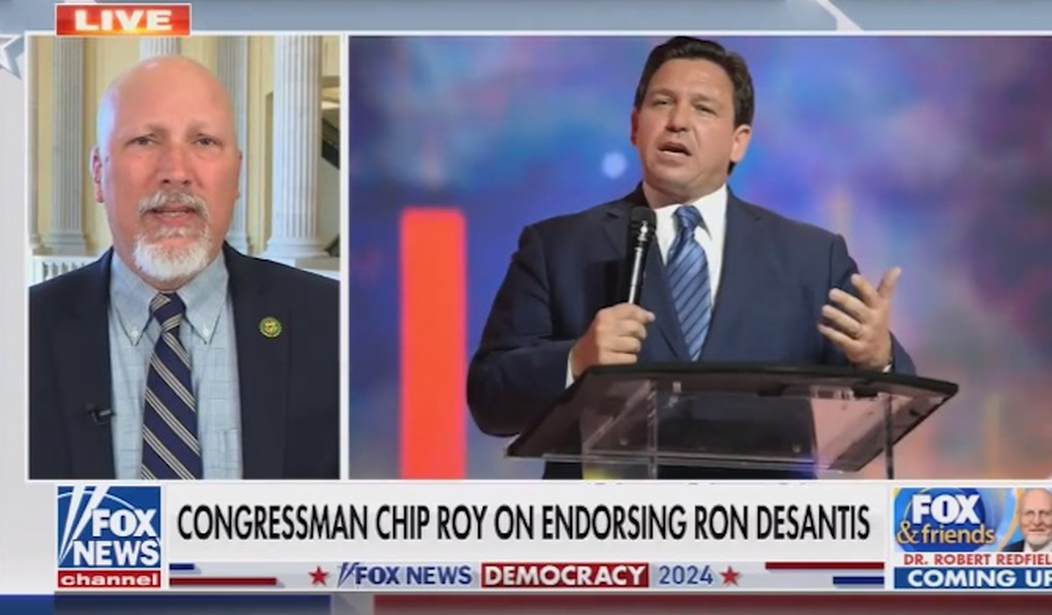Begun, the endorsement wars have … and they’re largely as meaningless as the Star Wars prequels, for that matter. As the field waits for Ron DeSantis’ entry into the race, other candidates have begun touting endorsements from members of Congress and other pols as a way to argue for momentum. That’s certainly fair, but the persuasive power of such endorsements are highly debatable.
Arguments and principles have more weight, which makes this endorsement from Rep. Chip Roy (R-TX) of interest. Roy has something of a following outside his district and has traction in the conservo-populist MAGA wing of the GOP. Rather than endorse Donald Trump, Roy backs DeSantis, which again isn’t necessarily going to move the needle with primary voters in and of itself. His argument might, however (via the Right Scoop):
“It’s time to have someone who’s not a baby boomer.”
— Rep. Chip Roy (R-TX) explains his decision to endorse Gov. Ron DeSantis (R-FL) as the 2024 Republican presidential nominee pic.twitter.com/otoG0Bx5Cz
— The Recount (@therecount) April 19, 2023
The man who helped bring us a more conservative Speaker of the House explained his support for Governor Ron DeSantis today on Fox News, saying he believes it’s time to have someone who’s not a baby boomer, who serve for two terms and can “beat the swamp that President Trump so ably started when he came in in 2016.”
Roy goes on to detail the governor’s accomplishments and why he would be a great president to root out the swamp that Trump began [to fight].
Roy does his best to offer this in a statesmanlike manner, crediting Trump for his efforts in his term as president while arguing for a next-generation fighter. Roy then goes over DeSantis’ accomplishments and argues that he’s the logical successor in the “drain the swamp” fight.
The baby-boomer argument matters the most, though, for multiple reasons. We started getting Baby Boomer presidents with Bill Clinton, and since 1992 voters have selected youth when given the choice. The 2000 election featured two Baby Boomers, and so did the 2016 and 2020 elections with candidates on the other end of the youth spectrum, which largely negated the trend. If Trump and Joe Biden get a rematch, that trend will get negated — again.
In this case, that would be a giant lost opportunity for the GOP. Democrats are stuck with Joe Biden if he chooses to run for a second term at 82 years of age. Thus far, every indication is that Biden will run again. Nominating a candidate of similar age — Trump or not — will dispense with a powerful argument that the next generation should take the reins now, rather than extending the Boomer grip on power.
Consider the demographics, too. In the 1990 census taken just before Clinton’s win, 32.5% of the population was born between 1946 and 1965. Another 10% were born between 1965 and 1972, on the outer cusp of the Boomers (but technically considered Gen-X). Slightly over 33% were born before 1946, and they tended to be more politically active — at least until 1992’s election.
The demographics today look much different. Working from Census data, Statista calculated in 2021 that Boomers comprise only 21% of the population, with another 6% from the preceding generation. The Gen-X and Millennial generations account for over 41% of the population, and another 20% are Gen-Z, born in 1997 or later. A significant chunk of that cohort is eligible to vote now, and more of them will be eligible to vote in 2024.
In 1992, roughly 50% of the population could identify with Clinton, while only a third could identify more with World War II vet George H. W. Bush. That probably got somewhat worse in 1996, when the GOP nominated another WWII vet, Robert Dole, to challenge Clinton. It certainly had an impact in 2008, when the GOP nominated then-72-year-old John McCain to run against 47-year-old boomer Barack Obama, although there was little to no chance that Republicans would have held the White House in that cycle regardless of nominee.
In 2024, only a quarter of the population will identify with the generation to which Biden and Trump belong. At least half will not identify in that way with a Boomer, especially an older Boomer, which is pretty much the same dynamic we saw in 1992 and 1996. Anyone significantly younger would have much more generational appeal and traction.
This problem could get alleviated with a candidate with broad appeal, respect, and affection. It didn’t help George H.W. Bush in 1992, however, and that doesn’t describe either candidate in a 2020 rematch. It wouldn’t describe either candidate in a 2016 rematch, either. The most remarkable aspect of the last two presidential cycles is how little affection voters have for any of the three main candidates that contested for the office.
This makes the question Roy raises particularly acute for Republicans. They do not have the shackles of incumbency on them the way Democrats do. They also have more of a bench among younger candidates than Democrats do even if Biden decided not to run. How long will the GOP keep doubling down on a shrinking generation of candidates and voters? And does it make sense to double down on a candidate that’s only eligible for one more term in office?








Join the conversation as a VIP Member